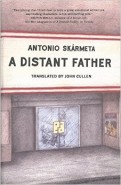
Book Review: A Distant Father by Antonio Skármeta
A Distant Father
A Novella by Antonio Skármeta, translated from the Spanish by John Cullen
Other Press,
September 2014
ISBN-13: 978-1590516256
$15.95; 101pp.
Reviewed by Louise Krug
Antonio Skármeta, a Chilean author who wrote the novel that inspired the 1994 Academy Award-winning movie, Il Postino: The Postman, has written fiction that has received dozens of honors, such as Chile’s National Literature Prize in 2014, and has been translated into nearly thirty languages. His latest, the novella A Distant Father (Un padre de película in Spanish), is a small but striking story of one young man’s search for the healing of a private pain. Skármeta, an adept craftsman, uses spare but forceful prose to tell a story about a journey that leads to surprises.
As A Distant Father opens in a small Chilean village, we meet the narrator, young Jacques, a schoolteacher. The first chapter is not even a page long, but by the end we know what he looks like (“I’ve got long legs, and nights of insomnia have stamped dark rings under my eyes”), the elements that make up his life (“the dying wail of the local train, winter apples…the patient spider in a shadowy corner of my room, the breeze that moves my curtains), and what plagues him and his mother, whom he lives with—loneliness.
By the end of the second page, we learn that Jacques’ Parisian father, Pierre, abandoned the family without any warning and went back to Paris one year ago. Jacques and his mother, whom this “almost killed,” have not heard from him since. The one person in the village who provides Jacques with information about his father is Pierre’s friend the miller. As Jacques says, “He knows more about Dad than I do myself. He knows more about Dad than my own mother does.” Jacques has also befriended the miller, and occasionally, while drinking together, he will give Jacques a tidbit of information about Pierre, but it never amounts to anything.
The one diversion Jacques has from this heartbreak is women, mainly an attraction to a pupil’s older sister, and the pull of visiting whores in the big city of Angol. While Jacques gets swept up in these dramas, his thoughts of his father’s disappearance never leave him. For example, just after sleeping with a prostitute he speaks bits of French to her in appreciation and explains that his father is from France. His father is so much a part of Jacques’ identity that he can never leave the subject for long.
Jacques is also a French translator for a newspaper, a skill that comes from having a Parisian father. Subtle, quiet humor with a punch of insight is woven throughout the novella that endears Jacques to the reader, such as when he states aspirations of publishing his own poetry: “Sometimes I include an original poem of my own in the envelope with my translations and ask the editor to consider publishing it. His response, though negative, is courteous, given that he never rejects my poems and never prints them either.” Or with his observations of a pupil’s two sisters: “Everybody around here is very respectable, and I have no doubt that Teresa and Elena come from a good family, but every time they go to Santiago, they buy dresses with plunging necklines and tight jeans that cling to their hips and squeeze the air out of my lungs.”
Jacques’ observations show that he is restless and needs to take charge of his own fate, while dealing with the wonder the most cutting kind of loss. His attempts to satisfy his yearnings for a different life lead him to some surprising, and at times dubious, situations. In the end, he makes some decisions that give him control, and forecasts a peacefulness that has not been seen by him for a long time. The fact that Skármeta can create a story about characters learning to forgive in such a small novel is a testament to the clarity and beauty of his writing. Each carefully chosen word rings true, and the poetic, spare language shows the reader how it’s never too late for people to direct their destiny.
Louise Krug is the author of Louise: Amended (2012), a memoir about the brain surgeries she had when she was 22. She teaches creative writing and composition at the University of Kansas in Lawrence, Kansas, where she lives with her husband and daughter. Some of her recent work has appeared in Parcel and Word Riot. She has a collection of essays forthcoming from 99:The Press in 2015.

